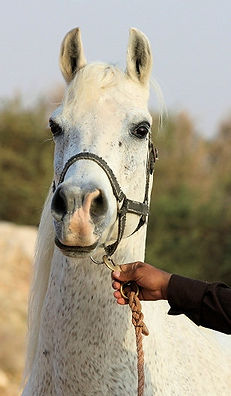Hamdani Simri
The Hamdani Simri strain is one of the most praised strains in Arabia. Al Hamdaniyat is mostly given as one of the Al Khamsa strains. Lady Wentworth states that “Hamdani merely means of or from Hamdan, and such is the origin of all strain names. Hamdan is still the name of a district in Yemen.”
The Hamani Simri originate with Ghadir al Simri al Dafeeri from Nejd according to the Abbas Pasha Manuscript. It narrates that twelve fillies passed to the tribes from the stud of Al Dafeer and how this strain was distributed among the tribes:
-
To Ibn Mohssen of the Shammar of al Jazirah in Mesopotamia and also to Ibn Ghorab of al Burayk of the Shammar (this is a long and complicated story and those horses went on to al Mohssen of Otaybah on the day of the battle of Burayda and to Hamdan al Sani of Otaybah, Turki Ibn Saud, Khalid Ibn Saud and Burayk al Saadun and back to the Dafeer.
-
To al Fardaf of al Harb (in exchange for a hostage) to al Joway´ayah (there they became Kadisha, not pure, and later they came
-
To al Sebah) to the stud of Rayyah Ibn Hanaydi of al Jadah of al Fidan
-
To Sani al Sanawet of Otaybah and later to the Mutair, Harb and Shammar and also one mare to Abbas Pasha via Faisal Ibn Turki
-
To Al Wajed to al Gomoussa (Mughir Ibn Buraykan, Ibn Jazil and al Jahal)
-
To al Fid´an (Ibn Ghobain).
Today the Hamdani Simri horses are quite rare. Already Lady Blunt states that it “is not a common type either among the Anazeh or Shammar.” They can be found all over Arabia: in Saudi Arabia, Bahrain, Syria, Iran. And also in the western world: in the UK, the USA and other countries. In Egyptian lines we do not have a Hamdani line. So the influence is limited to two stallions:
1. El Sennari c.1878 (Koheilan El Mossen/Muniet El Nefous of Abbas Pasha), bred by Ahmed Bey Sennari. El Sennari is the double grandsire of the important mare Bint Gamila 1911, dam of Ibn Rabdan.

Hamdaany Ra´an (Jellaby Hataan/Hamdanieh Khaznah), the favourite stallion of the King of Bahrain, HM Hamad Bin Isa al Khalifa.
Below: Hamdanieh Khawla (Shawaf Al Betaar/Hamdanieh Buttha) in Bahrain.



Sotamm (Astraled/Selma) at Crabbet Park, England, and his grandmother Sobha at the Imperial Russian Stud..
2. Sotamm 1910 (Astraled/Selma), bred at Crabbet Park and imported into Egypt. Sotamm´s dam Selma is by Ahmar out of Sobha by Wazir, bred by Mahmud Bey in the stud of Ali Pasha Sherif. Sobha is from the original Abbas Pasha mare Selma c. 1862. Sotamm is the sire of Bint Serra of the Babson imports. At Crabbet Park Sobha found an influential family with the mare Silver Fire as most prominent member. Sobha´s granddaughter Star of the Hills by Raswan was exported to Tersk and found a prolific line there. At Courthouse stud of Musgrave Clark a line was established by a gift that Lady Wentworth gave after she had acquired the famous stallion Skowronek in an unpleasant way. From the mare Safarjal (Berk /Siwa), a double Sobha mare, Somra II 1932 came by the desert bred Fedaan. Somra II gave Shammar, a show winner in his time. Another Hamdania Semriah mare was the famous Sherifa from Nejd, imported to England by the Blunts in 1878, but all of her fillies were sold. Al-Mashoor 1928 was bred by the al-Dalati family near Damascus and imported to the USA.
In modern time Arabia the Hamdaniyat is traditionally in high regard although rare, except for Saudi Arabia. There Haleem 1987 (Kais / Nawal), now at Nejd Stud, had been one of the principle sires at Dirab State Stud. In Syria the Hamdani Simri Ibn Ghorab or Hamdani Ibn Ghorab are in high esteem. One prominent example is Mubarak at Basil Jadan´s farm, bred by the Shammar. Most of the horses from this marbat show chestnut color and a bold type. The marbat is from Abd al Iyadeh al-Dar´am al Ghorab (El Dahdah). Also Bahrain breeds Hamdani horses, like Hamdany 71 1962 (Jellaby Speckled / Hamdanieh Fatis). His dam was bred at al Kharj in Saudi Arabia. And Turkey imported the stallion Hamdani 1925, a Hamdani Semri from Iraq in 1932.
Hamdaany Zaizoom (Saqlaawy Saba´an /Hamdanieh Khaznah) in Bahrain and Haleem (Kais/Nawal) in Saudi Arabia.



